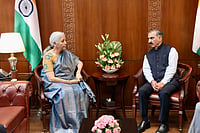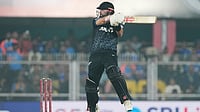No long queues were seen in the banks of Kolkata for the exchange of Rs 2,000 notes, which were withdrawn from circulation, on the first of the exercise on Tuesday, officials said.
General Secretary of All India National Bank Officers' Federation Sanjoy Das said the exchange of Rs 2000 notes went off peacefully during the day with no reports of any untoward incident in any of the branches.
This is primarily because Rs 2000 currency notes in circulation are less and its printing had stopped in 2019, he said.
These currency notes will continue to be legal tender till September 30.
Bankers said they were prepared to handle a large number of people seeking to exchange the high-value currency notes, but there were no long queues and branches were able to handle the situation without hassle.
"We monitored the situation. People came for exchange but the number was not so large that we had to take additional measures. We were prepared for a rush," State Bank of India CGM (Kolkata) Prem Anup Sinha said.
A UCO bank manager said there were some exchange requests and there was no rush this time.
An official from HDFC Bank in South Kolkata also stated that there had been some flow of customers for exchange requests and those were promptly serviced.
According to RBI guidelines issued on Friday, a person can exchange up to a limit of Rs 20,000 at a time without filling out any form or requisition slip and no identity proof is required.
In a surprise move, the Reserve Bank of India (RBI) on Friday announced withdrawal of Rs 2,000 currency notes from circulation but gave the public time till September 30, to either deposit such notes in accounts or exchange them at banks.
The central bank had said this move comes under its 'Clean Note Policy', which ensures "availability of good quality banknotes to the members of public".
RBI Governor Shaktikanta Das said there was enough time available for exchange and deposit in bank accounts and that there was more than an adequate quantity of printed notes available in the system.
About 89 per cent of the Rs 2,000 denomination notes were issued before March 2017 and are nearing the end of their estimated life span of four to five years.
Unlike November 2016, when old 500 and 1000 rupee notes - constituting some 86 per cent of the currency in circulation - were banned overnight, Rs 2000 currency notes continue to be legal tender for now, and the exchange window is more than double of that provided in 2016.
While the Reserve Bank of India (RBI) has not made the presentation of a valid ID or filling of deposit forms mandatory, there were complaints from some places that banks were demanding customers to submit identity cards as proof.
Some banks exchanged notes by making an electronic entry, few others asked customers to pen down their name and mobile number in a register without giving any identity proof.


























